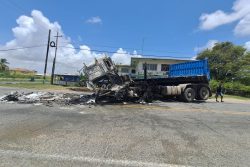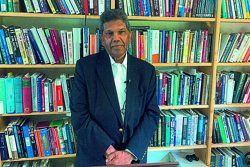Former Jamaican Police Commissioner Mr Francis Forbes recently took over as the Interim Executive Director of the troubled Caricom Implementation Agency for Crime and Security.
In a statement following his appointment the agency had this to say about the importance of all stakeholders being kept apprised of the work of the agency and particularly through the media.
“The media like IMPACS also have a duty to the people of this region to do whatever is necessary in ensuring transparency without endangering security. The Interim Executive Director wishes to also indicate that his early commitment therefore, is to engage in honest dialogue with the media in recognition of the important role it plays in informing and educating our main stakeholders, the people of this CARICOM”.
The statement added: “The Agency as a regional security institution operates within a context of trust. One of its daily responsibilities is handling matters of a sensitive nature and the information owned by individual law enforcement agencies. Unfortunately, this often brings with it a burden in terms of striking a balance between that which may be put in the public purview as opposed to what cannot be disseminated for public consumption in the interest of security and public safety. It is the intention of the Interim Executive Director, however to enhance communication with the media in the weeks ahead by the most appropriate means. Hopefully a partnership of trust will develop over time and work in the interest of our main stakeholder, the everyday Caricom man and woman”.
This is a clear statement of intent that at once captures the inherent tension of giving enough information to the public without compromising security while at the same time recognizing that the security agency is in the service of the people and trust been the two is paramount. It also properly recognizes that the media is the vehicle through which this service can be accomplished.
Cynics might say that Mr Forbes is now at the helm of a wounded security agency and has to `play up’ to the public. It is more likely however that IMPACS genuinely apprehends that without a transparent and full engagement with the people, the public trust that security agencies rely on to thrive would not be forthcoming and the agency would wither away.
Here in Guyana, which has a vital input like all other Caricom members in IMPACS, the Police Commissioner, Mr Henry Greene is alleged to have passed an edict rolling back the commendable decision made under previous commissioner Mr Winston Felix for divisional commanders to speak to the media. Mr Greene has not yet provided the public with an explanation behind his thinking but several commanders have told various media houses that they are no longer able to speak to reporters because of the order.
It has to be said that access to the commanders didn’t work perfectly as some were not as forthcoming or as well-informed as others. Yet, it helped reporters immensely as they couldn’t sit back and wait until the Police Public Relations Office got around to issuing a press release. Some days press releases are not issued at all even on major criminal acts. Aside from the provision of information, access to the commanders also served another purpose. It signalled to the public that the police respected the public’s right to know and therefore was entrusting commanders with the freedom to provide information to the media and the public.
The rolling back of access to the commanders sends the opposite signal. It entrenches in the mind of the media and the public that the police force has little respect for the media or its seminal role of interfacing with the public. It will also further corrupt the force as individual ranks will sell information to media houses who are willing to pay for it.
It is perhaps no surprise that the police force could unilaterally pull the plug on access to commanders without even contemplating a discussion with the press association or media houses. The force – far from being the service-oriented organization one expects it to be – operates keenly and closely in a central government framework that is contemptuous of the public’s right to know and the importance of public input.
The biggest loss from this decision will be to the force itself. The public will see it in even clearer light as an institution that is backwards, moribund, dysfunctional, in need of fundamental shaking up and change in personnel from top to bottom. As the elections approach and public trust and participation become even more important, the force is retreating further into unaccountability.
The decision of the force is also incongruous with the state’s belated introduction of the Freedom of Information Bill.
Whatever the thinking, Mr Greene should immediately reverse the decision and engage with the media on how to improve access to public information.









